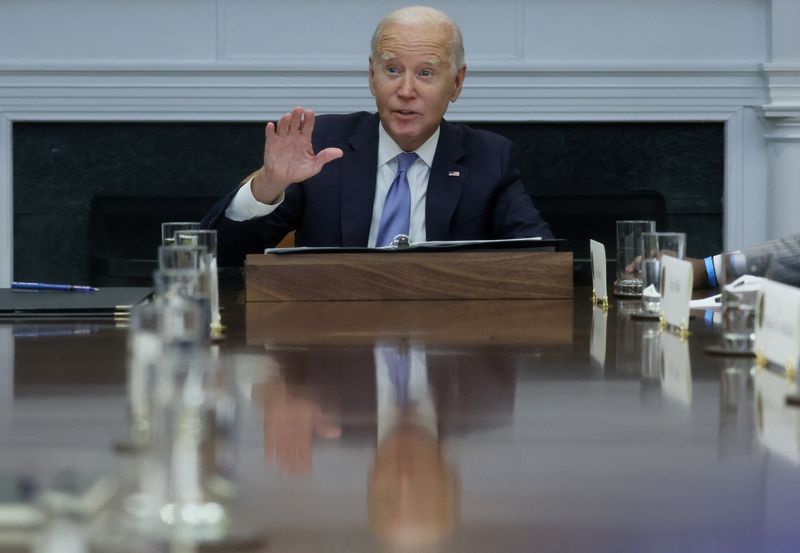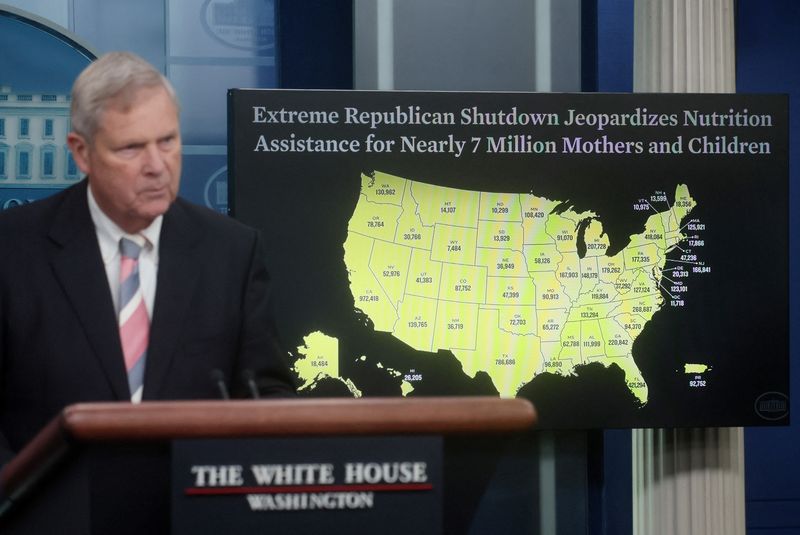By Steve Holland
WASHINGTON (Reuters) -U.S. President Joe Biden and one of his top aides warned on Monday that a federal government shutdown could cause widespread suffering, including a rapid loss of food benefits for nearly 7 million low-income women and children.
Biden told a meeting on Historically Black Colleges and Universities that failure by Congress to fund the federal government would have dire consequences for the Black community, including by reducing nutritional benefits, inspections of hazardous waste sites and enforcement of fair housing laws.
He said he and House Speaker Kevin McCarthy had agreed a few months ago on spending levels for the government.
"We made a deal, we shook hands," he said. "Now a small group of extreme House Republicans .. don't want to live up to that deal, and everyone in America could be faced with paying the price for it."
Asked if he had spoken with McCarthy, Biden said, "I haven't." He shook his head when asked when they would speak.
U.S. Agriculture Secretary Tom Vilsack told reporters earlier that the "vast majority" of the 7 million participants in the Special Supplemental Nutrition Program for Women, Infants, and Children (WIC) program would see an immediate reduction in benefits in the days and weeks after a shutdown starts.
Nearly half of U.S. newborns rely on WIC, the USDA says.
A separate benefits program, Supplemental Nutrition Assistance Program (SNAP), will continue as normal for the month of October but could be affected afterward, he said.
More than 40 million Americans relied on SNAP to make ends meet in 2022; inflation has put new pressure on household budgets, with prices higher since the COVID-19 pandemic for goods from bread to fresh vegetables and baby formula.
During a shutdown, farm service agencies will also stop making loans to farmers during harvest time, and new homebuyers will not be able to get loans in rural areas, Vilsack said. More than 50,000 Department of Agriculture workers will be furloughed, meaning they will not receive a paycheck.
The Republican-controlled House of Representatives may move to advance steep spending cuts this week that would almost certainly be rejected by the Democratic-controlled Senate. While the cuts would not become law, a failure by both chambers to agree could force a partial shutdown of the U.S. government by next Sunday.

House lawmakers on Tuesday were set to take up four spending bills for the coming fiscal year that would also impose new restrictions on abortion access, undo an $11 billion Biden administration climate initiative, and resume construction of the Mexico-U.S. border wall, a signature initiative of former President Donald Trump. Biden has vowed to veto at least two of the bills.
Vilsack called Republican fiscal plans "punitive" and "petty."
